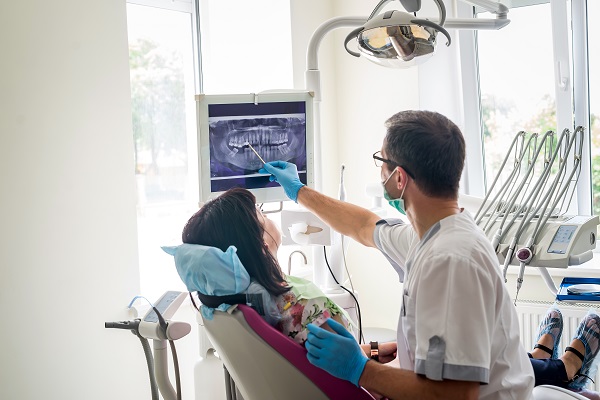How Often Should You Have a General Dentistry Visit for an Oral Cancer Screening?

General dentistry places a focus on preventing oral cancer. Regular screenings are a good way for you to help yourself remain healthy, no matter what your age is. In fact, according to the Oral Cancer Foundation, the death rate for oral cancer is very high. It is even higher than more common cancers such as skin cancer. If you have not visited a dentist for an oral cancer screening, now is a good time to change that. Keep reading to learn how often you should consider getting this done.
About oral cancer
What makes oral cancer scary is that many patients do not have symptoms right away. By the time the symptoms show up, the patient’s cancer has often already spread. Even if there are no symptoms, the patient can still be at risk for the condition. In fact, patients can even have cancer without any symptoms. Sometimes, patients discover the cancer once it has spread and gone to vital organs.
Early signs of oral cancer
The symptoms can vary depending on the patient. However, patients often have some common early signs of oral cancer. For example, it can be hard to swallow or to chew. Moving the tongue may become difficult.
There might be irritated or dry patches in the patient’s throat. These signs often do not appear until the cancer has already spread. For patients who have these signs, getting an oral cancer screening right away is important. This can help patients get treatment early.
How often to get screenings
The opinions vary on how often a patient should be screened. However, many dental health professionals recommend about once a year for screenings. According to the American Dental Association, patients should get screenings every year. The sooner that oral cancer is caught, the better it will be for patients. Some risk factors, such as smoking, may mean that some patients need to get screenings more often.
Risk factors of oral cancer
Patients who have many risk factors should get more frequent oral cancer screenings. This could be twice a year or more often. One risk factor is sun exposure, as many patients do not use sunscreen around the mouth. Tobacco use and alcohol use are also risk factors. Gender, age and diet can all play a role. Those who have been exposed to HPV may be at a higher risk.
Visit a general dentistry practice for an oral cancer screening
Many people do not fear oral cancer as much as other types of cancer. However, it is just as dangerous and, sometimes, it is even more widespread. You should visit your general dentistry practice to get a screening at least once a year. Your health may depend on you getting an early screening for this type of cancer. At a general dentistry practice, you can receive recommendations on how often to be screened. Make an appointment today to potentially save your life from cancer.
Request an appointment here: https://www.dentistofvisalia.com or call Visalia Care Dental at (559) 975-1213 for an appointment in our Visalia office.
Check out what others are saying about our services on Yelp: Read our Yelp reviews.
Related Posts
You may need a type of dental restoration at some point in your life. There are many types of treatments available. Knowing how to select each one can give you the results that you need. Here are some tips on how to choose the right type of dental restoration procedure that will fit your dental…
Many people underestimate the importance of regular visits with a general dentist. They assume that daily brushing and flossing are enough. While at-home care is crucial, routine dental checkups ensure long-term dental health and prevent oral health complications.A general dentist functions much like a primary care provider for a person's mouth, serving as the first…
A strong and stable dental restoration can replace your missing tooth. Many people suffer from tooth loss. Using removable dentures is a way to fill the dental space. This can prevent many dental issues from developing. Here are the dental restoration options available for your missing tooth.The dentist will assess the patient’s mouth and see…
A root canal removes the infected pulp, then cleans and seals the tooth. Many patients may be unsure if there is anything else they need to do after the root canal. The answer is yes; they will need a dental restoration to restore the tooth's functionality. Let us dive into why leaving a treated tooth…
